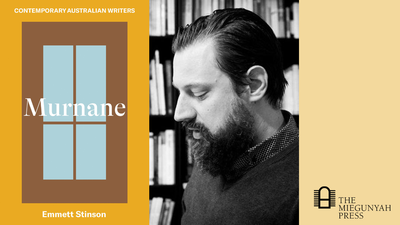EXTRACT: Emmett Stinson interviews Gerald Murnane

This review was conducted in the Men’s Shed in Goroke in October of 2019. Murnane had recently won—for the first time—a major Australian prize for a novel, when Border Districts received the Prime Minister’s Literary Award in late 2018. It seemed like an opportune time to ask Murnane questions about the way that his work had been valued, and what this late recognition meant to him. I was particularly interested to get his views on how the internet had in many ways propelled his status—since much of the buzz around Murnane’s work had developed online over the last ten years in blogs, on social media like Twitter, and on social reading sites like Goodreads. I was curious to see whether and to what degree he was aware of the way that digital technology had supported the reception of his work.
The internet appeared during the period when you had quit writing. I know you are not a computer user, but do you have a sense whether it has helped your reputation? Do you think it’s connected your fans to one another?
In the past, books themselves were a sort of internet. Some bloke would write to me from California and say, ‘I found a second-hand copy of Landscape with Landscape in a bookshop in San Francisco. It’s an amazing book.’ And I thought, how did it get there? But he’s read it and he has written to me, so I knew this was happening. The intensity and the sheer volume of what happens now, though, I cannot comprehend. I get inklings of it. The other day I said to Ivor [Indyk, Publisher at Giramondo], ‘Things are pretty quiet now after the big event on my eightieth birthday.’ And he said, ‘They are never really quiet. If you could see what’s being said about you on social media, you would be highly gratified.’
I don’t like thinking about it. It’s a bit like my primitive feelings—and this is going to amuse you—about my calculator. When I’m doing calculations with random numbers and probabilities in the racing world [in Murnane’s racing game known as the ‘Antipodean Archive’], I only input numbers up to three decimal places, so it doesn’t strain the calculator. I have this primitive awe of the internet. Every night before I go to bed, I wipe out all of my phone conversations. I have only two friends whose conversations I keep, because I don’t want to put too much of a strain on my pet machine. So, I have only a primitive sense that there are words about me flying around from one tower to another. The amazing thing about this latter-day fame—and I do not want to seem ungrateful—is that my writing hardly changed. It was the attitude of readers that changed.
You have many overseas fans of your work, including some notable US writers, many of whom could read you because your books had been published there and existed in used book shops, which was certainly the case for The Plains. How did The Plains come to be published in the US?
The Plains was first published in America in 1985 by George Braziller. Poor old George, whom I never met, put his heart and soul and lots of his money into the promotion of that book. It pretty well sank without a trace, as far as I know. I think this was largely the result of one review in Publishers Weekly, which I’ve got a copy of. The key words in it were ‘philosophical treatise’. I used to say, well, imagine it’s a cold Friday afternoon in Wichita, Kansas. You are the leading bookseller in town and no-one is in the shop at the moment, so you get out Publishers Weekly and see if you can find six recent novels to buy. And skimming through those, you see these words ‘philosophical treatise’, and just keep going. I imagine that was what happened in bookshops all over the United States. That was the end of The Plains in America. I was told afterwards that it rocked Braziller’s confidence: he thought this book was going to do well, but his judgment seemed astray.
It was published again by a small publisher at the University of South Michigan in a place called Kalamazoo. The reasons for these things always go back to one person: in this case, a young Fulbright Scholar, whose name escapes me, who came to Australia in the early 90s and became enthusiastic about my work. He got an academic post at a university in Georgia and he prevailed on an editor friend of his at this university press in Kalamazoo to do an edition of The Plains. Things went wrong from the start. The editor became unwell and left the press, and they didn’t publicise the book. I don’t even know how I got a copy. I know that it was published, but whether it even got distributed I wouldn’t have a clue. I thought those were my two chances, and I wouldn’t get a third.
Well, this man called Jeremy Davis sent me a letter around about 2012 after I had moved to Goroke. In the letter, he said he had never been so moved by a work of fiction as he had been moved by Inland. And I felt very appreciative of that. Inland is the book that I put the most feeling into. I have ways of describing or categorising my books. The book I put the most thought into, in the sense of theoretical thinking, was A Million Windows. I regard A Million Windows as more impor- tant than The Plains, but The Plains was the one that made my reputation.
Anyway, Jeremy Davies at that time was at a small press called The Dalkey Archive and he published Inland and then Barley Patch. Neither of those books—for whatever reason— was successful at all. Again, I thought, OK, that’s it. I am never going to be successful in the United States, certainly not in my lifetime. Then Jeremy moved to Farrar, Straus and Giroux in New York—the Parnassus of world publishing. And then Mark Binelli came out from The New York Times and he had actually read several of my books and we got on very well. I tend to get on well with most people who like my books. It’s like they’ve decided already that I couldn’t be too bad a bloke. Well, Mark Binelli wrote his long piece about me, and the Americans discovered me at last, you might say.
You’ve spoken in the past about your often fraught relationship with publishers, who have asked you to change your work, especially earlier in your career. How has that been different over the later part of your career?
I have cautioned people before: don’t you dare to suppose that I simply sat down with a program of writing at the age of twenty-five, and then had book after book published without a hitch. While I was writing every book, I was aware that my current publisher might not like it or might publish it grudgingly. Emerald Blue failed because the publisher couldn’t be bothered publicising it. So my book suffered as a result. It irked me when people would ask me, ‘What are you writing now?’ Well, there’s not much point in me telling you what I’m writing, if it’s not certain to be published!
The turning point in my career was when Ivor Indyk kept pestering me at this conference [on Murnane’s work] in Newcastle in the week when the buildings were destroyed in New York. I’d never met Ivor, but I had sent him things for his magazine, HEAT. He came up and said, ‘Could you send me a copy of your speech, “The Breathing Author” and I’ll publish it?’ And that led to his publishing Invisible Yet Enduring Lilacs. The feeling that I had a sympathetic publisher at last at the age of sixty—that helped in no small way to generate the books that followed.
So was Barley Patch written with the knowledge that Giramondo would publish it?
Not only that, but it was written after I’d been working on this thing called, O, Dem Golden Slippers and I had lost confidence in myself. I’ve lost confidence in myself several times over the years: not in the sense that I couldn’t write what I wanted to write and very well, but that I couldn’t write anything that people would publish. Because of Emerald Blue’s failure—and it was a commercial failure—I doubted if O, Dem Golden Slippers was publishable. If I had taken it in a synopsis form to any publisher, I think they would have just politely told me to take it somewhere else. And that was the feeling I had all through those silent years when I was working on my horse-racing archive rather than writing. Barley Patch is not really a book so much as it as an explanation as to why another book wasn’t written, that book being O, Dem Golden Slippers.
With Barley Patch, I knew the whole time that I probably had a publisher for it. I felt liberated and grateful for the opportunity to rewrite a book that I thought could have been of enormous merit, but which got out of control. Still, I don’t want you to think that Ivor automatically accepted whatever I wrote. For example, he objected once to my using a reference to masturbation, and I went off at him about it. We had our occasional differences.
Perhaps O, Dem Golden Slippers got out of control because I thought it would be hard to find a publisher, and I could almost say, ah, who cares? I have taken many wrong turns. If I just gave you the merest glimpse into my literary archives, where there’s a drawer for each of my books, you’d see false beginnings and wrong turnings and abandoned ideas. Even in Landscape with Landscape, which began as a collection of short stories, there were two fairly sizable pieces that were left out: ‘Her Skin Can Stand the Closest Inspection’, which was a reference to an old ad for luxury soap, and another long piece. In fact, there’s a whole drawer at the end of my archives, the sixteenth drawer, which is labelled ‘Unpublished or Unfinished’.
This is an edited extract from Murnane by Emmett Stinson.

